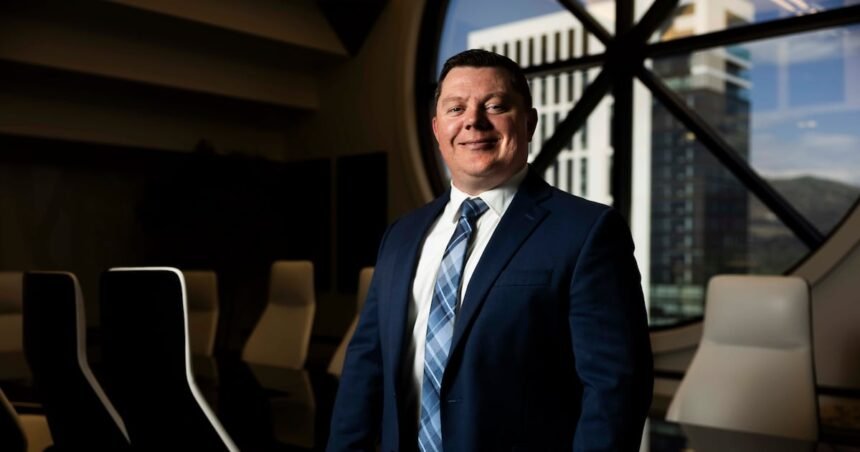The business storyteller-in-chief of the Beehive State believes Utah’s breakneck growth comes down to just that: its story.
Over the past decade, Ryan Starks has carved out an identity as Utah’s most effective salesman, repeatedly finding himself at the center of transformational change.
He oversaw Heber Valley’s explosion into one of the country’s top–five fastest growing areas as director of Wasatch County’s tourism and economic development arm.
He stewarded the deal that brought Utah its largest private investment ever, with the $11 billion expansion of Texas Instruments’ microchip fabrication plant in Lehi.
And his reputation was further cemented last month by his transition from leading the Governor’s Office of Economic Opportunity to its private sector counterpart, the Economic Development Corporation of Utah.
While the offer to head EDC Utah may have come as a surprise to Starks, it didn’t shock those who had followed his trajectory over the preceding 15 years, from a Jon Huntsman Jr. intern to the face of state corporate recruitment.
But Starks is quick to downplay his role as the common denominator of Utah economic development; it’s the special product that is Utah, he says, not his marketing pitches, that have propelled the state to No. 1.
“We have the perfect ingredients to boast the world’s best economy,” Starks said in an interview with the Deseret News.
These ingredients — strong families, skilled workforce, smart policy — align with what Starks sees as his true mission, to build Utah communities by leveraging the private and public sector.
But not everyone in conservative Utah is on board with the vision of public-private partnerships that Starks has come to represent.
To some businesses, Starks’ model for attracting powerhouse employers looks more like picking winners and losers. And to the libertarian-minded, his methods of company outreach appear concerningly like corporate welfare.
The counterargument is simple, according to Starks. Yes, Utah must be careful about government intervention becoming too heavy-handed.
But that doesn’t mean public officials and business leaders should sit on their hands — especially not when confronted with questions of how Utah got here and where it should go.
“We need to shape growth, or growth will shape us,” Starks said. “And so what is economic development? It’s … putting together a strategy for community.”
‘Scrappiness’ and ‘gratitude’
The community that shaped Starks still finds its way into every interaction he has with executives and lawmakers around the world, from his drawn-out Ogden Valley accent, to his competitiveness as a former Weber High wrestler, to his punctuality learned from 6:30 a.m.-starts working at the Wolf Creek golf course.
But Starks attributes his character and his accomplishments to those who raised him. The middle child of five brothers, Starks and his siblings grew up to have an outsized impact on Utah’s economy, including Aaron Starks, CEO of Utah’s Aerospace & Defense association, and Steve Starks, the CEO of Larry H. Miller Company.
“The secret was they made us work for everything,” Starks said of his parents. “They instilled in us scrappiness, hard work, resourcefulness and gratitude.”
The Starks family didn’t have a lot of “material resources,” Starks said. His dad switched between jobs as a police officer and a semi-truck operator. His mom was a “house warrior” who “ran a tight ship, cracked the whip when she needed to, but shaped us boys into who we needed to be.”
After high school, Starks served a two-year mission for The Church of Jesus Christ of Latter-day Saints in Quito, Ecuador. He attended Weber State University, studying business and Spanish, before snagging an internship at what was then called the Governor’s Office of Economic Development.
Here Starks discovered what made him tick. There was a thrill, he said, to identifying a community in need and shepherding it through the cycle of infrastructure, investment, entrepreneurship and expansion. And then starting all over again.
This thrill led him to graduate programs in public administration and economic development, before pulling him back to the Governor’s Office of Management and Budget, and ultimately landing him in Heber City, directing Wasatch County’s Chamber of Commerce and high school CAPS program.
“I learned that the state has to have a very clear and strong vision of what it wants to be and who it’s not,” Starks said. “And it takes everybody working together in a very intentional way to achieve the results that we want.”
Guiding hand or centrally planned?
Starks’ record outside the Wasatch Front led the Governor’s Office of Economic Development to seek his help running its rural programs in 2019. Three years later he was appointed by Utah Gov. Spencer Cox as executive director of the renamed Office of Economic Opportunity to oversee Cox’s initiatives statewide.
Looking back on his tenure, Starks identified three highlights: creating a “revolutionary” rural grant program to make financing more available in 24 Utah counties, securing the expansion of Texas Instruments with around 800 new jobs, and raising Utah’s international profile with the Joint Utah Mexico Partnership.
As executive director, Starks partnered with World Trade Center Utah on multiple trips to strengthen Utah manufacturing in Mexico; to forge new ties with South Korea, Japan, United Arab Emirates and Israel; and to reassure allies in Canada immediately following the implementation of a new American tariff regime.
Beyond the number and quality of companies that chose to locate in Utah, Dan Hemmert, Starks’ predecessor at GOEO, and a former state senator, said another indicator of Starks’ success is that the state remained No. 1 in quality of life, business startups and economic outlook. Or, in other words, “he didn’t break it.”
“He’s stable, he shows up,” Hemmert said. “And he’s not about the transaction, he truly cares about the person.”
But to others on the inside of Utah economic development, Starks’ position has appeared more like that of a corporate kingmaker than a brand ambassador for the state.
Jonathan Johnson, the former CEO of Overstock.com, and Gov. Gary Herbert’s Republican challenger in 2016, said that in his experience, state-managed economic development programs often benefit large, out-of-state corporations with taxpayer subsidies, while leaving smaller businesses out of the picture.
“My worry is that economic opportunity offices turn into a form of crony capitalism,” Johnson said.
The kind of tax breaks often cited for bringing Texas Instruments-sized deals to Utah are rarely, if ever, the actual reason companies decide to settle here, Johnson said, pointing to multiple studies that show at least 75% of companies have already decided to make an investment before seeking state incentives.
More important factors for businesses include employee education, light regulation and low overhead costs, in Johnson’s view. Instead of changing company executives’ minds, what corporate tax breaks can do is create an incentive for local and national businesses to feign uncertainty so that state officials scramble to sweeten the deal, he said.
Public economic development programs could actually do the opposite of what they are intended to do in the long run by creating more touch points with inefficient government bureaucracies, said Jason Chipman, the director of public policy at Utah’s Libertas Institute.
“What it ends up doing is creating a bit of a regulatory merry-go-round where they end up creating new departments and new programs to address the deficiencies of former created departments and programs,” Chipman said.
A better solution would be to decrease regulations and the tax rate for all corporations, Chipman said. Otherwise, regulations can be weaponized by large corporations against their competitors and tax breaks can be used to subsidize sports stadiums, he said.
Shaping Utah’s future
This characterization of Utah economic development doesn’t fit the practical reality states are faced with, according to Val Hale, who led the Governor’s Office of Economic Development under Herbert for 6½ years.
“If the state chooses not to be a player in this type of endeavor, then companies will just take jobs elsewhere, it’s a fact,” Hale said. “You’re either going to grow or you’re going to start to die. There’s no status quo.”
After first meeting Starks in Ecuador on a trip to pick up his son from a mission, Hale later sought out Starks to help scale up the state’s rural economic outreach, leading to the creation of the Rural Economic Development Tax Increment Financing program.
About two-thirds of these so-called EDTIF incentives are used to help Utah companies expand, rather than to draw in out-of-state business, Hale said. This process allows companies in certain industries to receive tax credits if they meet contractual performance benchmarks.
The state takes a “very conservative approach” to providing these business subsidies, according to Starks. But it is still essential for economic development programs in the state to prioritize having transparent relationships and clearly outlined public goals.
Now that he has joined EDC Utah, a nonprofit that operates as part of the Salt Lake Chamber organization, Starks will help to make connections between businesses and Utah communities, facilitating site selection and corporate recruitment.
Starks said EDC Utah will focus on what it sees as Utah’s strengths: life sciences; advanced manufacturing; aerospace and defense; energy, mining and critical minerals; financial services technology; tech and software; and retail.
Among their members EDC Utah counts several municipalities and GOEO, which previously had contracted with EDC Utah to manage corporate recruitment. As a private organization, EDC Utah could cozy up to companies in a way government entities could not.
While at GOEO, Starks chose not to renew this contract with EDC Utah, an experiment which Starks called a “mixed bag.” Now that he is on the private side of the public-private partnership, Starks said he will try to reenter that government contract with the state government.
“We’re hopeful to work with the Legislature to show that one plus one will equal three in this case,” Starks said. “But with or without the state, EDC Utah has a very clear mission and is doing amazing work.”
That mission, which Starks has come to embody, isn’t to pull in corporations with big dollar signs, he said.
It’s to present a narrative of Utah as a place where the “entrepreneurial spirit” and the “willingness to work together to make something bigger and better” are found in abundance.
“First and foremost, I love building Utah’s communities,” Starks said. “Let’s build together.”











